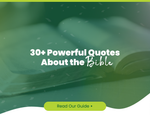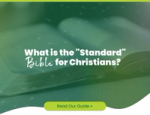What are the Books of the Bible?
Aaron Lewendon - Eden Bibles & Bible Study Specialist

The Bible isn't one book, but rather a collection of 66 books. Split into two sections, named the Old and New Testaments, the Bible is the foundational text for Christianity. It tells the whole arc of the world, from the creation of the world up to its coming end. In between, it focuses on the story of God's chosen people, their origins and struggles, then on to the birth of Jesus, the founding days of Christianity and the early period of the Church.
Covering such a wide subject means employing not only different narrators and storytellers but also encompassing different genres and styles of narrative. There is history, myth, poetry, song, regulation, letters, epics, bildungsroman (coming of age), eyewitness accounts, prophecy and more.
All of this means that the Bible is a disparate collection with a singular message: the love of God overcomes all.
Many of the books of the Bible can be grouped together as a way to organise (and help you remember) the different books of scripture.
The two main groups of books in the Bible are the Old Testament (OT) and the New Testament (NT). The first covers creation and the people of Israel, the second the coming of Christ and the foundation of the Church.
Within those, there is further grouping - much like folders on a computer, the groups cascade down into smaller clusters.
These are:
The Law Books (OT)
Covering the beginning of the world, the early days of the people of Israel and the rules that defined them as a people, this section includes the books of:
- Genesis
- Exodus
- Leviticus
- Numbers
- Deuteronomy
The History Books (OT)
Here we get a linear telling of how Israel went from a small collection of tribes just out of captivity into a nation. It tells of how they were ruled by judges and by kings, as well as the ways that human leadership fails without God's guidance. The history books of the Bible are:
- Joshua
- Judges
- Ruth
- 1 Samuel
- 2 Samual
- 1 Kings
- 2 Kings
- 1 Chronicles
- 2 Chronicles
- Ezra
- Nehemiah
- Esther
The Wisdom Books (OT)
Here we get a big change in tone. Prior to the Wisdom Books, the Bible has been narratively driven. There are the struggles of God's people, stories of courage and faith as well as tales of hubris and weakness. But now the books take on a more poetic and fragmented form. There are songs, poems and lyrics, as well as collected wisdom and sayings. The Wisdom Books consist of:
- Job
- Psalms
- Proverbs
- Ecclesiastes
- Song of Solomon
The Prophets Books (OT)
The final group of books in the Old Testament are books of prophecy. These centre around key figures who brought messages or guidance and warnings to the people of Israel. They were often instructions on what should change, what will happen if they don't and what will come in the future. These books also speak of the coming of God's Son. Often, these books are split into Major Prophets and Minor Prophets, but collected together they are as follows:
- Isaiah
- Jeremiah
- Lamentations
- Ezekiel
- Daniel
- Hosea
- Joel
- Amos
- Obadiah
- Jonah
- Micah
- Nahum
- Habakkuk
- Zephaniah
- Haggai
- Zechariah
- Malachi
The Gospels (NT)
Arguably the most well-known and most-read portion of the Bible, the gospels tell the story of Jesus' life, death and resurrection from four different narrators, who give their names to the books of the gospels:
- Matthew
- Mark
- Luke
- John
Church History (NT)
There is a single book given to this section of the Bible that covers the early days of the Church and the spread of Christianity through the Mediterranean region and beyond:
- Acts
Paul's Letters to the Church (NT)
A guiding collection to this day, Paul's letters to the Church offer wisdom for living as a Christian, as part of a Church and in understanding scripture. The letters are:
- Romans
- 1 Corinthians
- 2 Corinthians
- Galatians
- Ephesians
- Philippians
- Colossians
- 1 Thessalonians
- 2 Thessalonians
- 1 Timothy
- 2 Timothy
- Titus
- Philemon
General Letters to the Church (NT)
In addition to the letters of Paul, there are more letters of guidance and best practice for Christians and the Church at the time. These letters are named:
- Hebrews
- James
- 1 Peter
- 2 Peter
- 1 John
- 2 John
- 3 John
- Jude
Prophecy (NT)
Just as the New Testament ends by looking forward to Christ's coming, so does the New Testament. The final group is also simply the final book of the Bible, detailing the visions a man named John experienced after a shipwreck on an island:
- Revelation
To help you know more about the Bible, you can explore our collection of Bible Study Guides to find out more about Scripture.
If you are new to the Bible and want a quick, easy-to-digest overview, I recommend the One Hour Bible. It does a great job of explaining the individual books of the Bible as well as the Bible's overall arc.
Finally, if you want to get stuck straight into scripture, then you can read our Guide to Choosing a Bible and use our Bible Finder tool to discover the version of the Bible that is right for you.
Latest Blogs

Gifts
Finding Your Symbol of Faith: A Guide to Christian Cross Necklaces
Looking for the perfect symbol of faith? Explore our guide to Christian cross necklaces, from rustic wooden designs and sturdy men's chains to elegant silver pendants.

Gifts
The Best Christian Gifts for Under £20
Looking for a meaningful gift that won't break the bank? Explore our guide to the best Christian gifts under £20, from inspiring journals to beautiful home decor.

Gift Guide
15 Confirmation Gift Ideas for Boys and Girls
Celebrating a confirmation? Discover 15 meaningful gift ideas for boys and girls, from youth Bibles and jewellery to inspiring journals and keepsakes.

Bible
30+ Powerful Quotes About the Bible (For Inspiration in 2026)
Looking for inspiration? Discover a curated collection of the most powerful quotes about the Bible, from famous historical figures to modern theologians and Scripture itself.

Bibles
What is the "Standard" Bible for Christians?
Is there an "official" Bible that all Christians use? We explain the difference between the NIV, KJV, and ESV, and help you find the standard text for your church or personal reading.

Bible
"I Keep Failing to Read the Bible" – 5 Tips to Make the Habit Stick
Do you start a Bible reading plan only to quit a few weeks later? Stop the cycle of guilt. Here are 5 psychological tips and practical changes to help you build a Bible habit that actually lasts in 2026.
